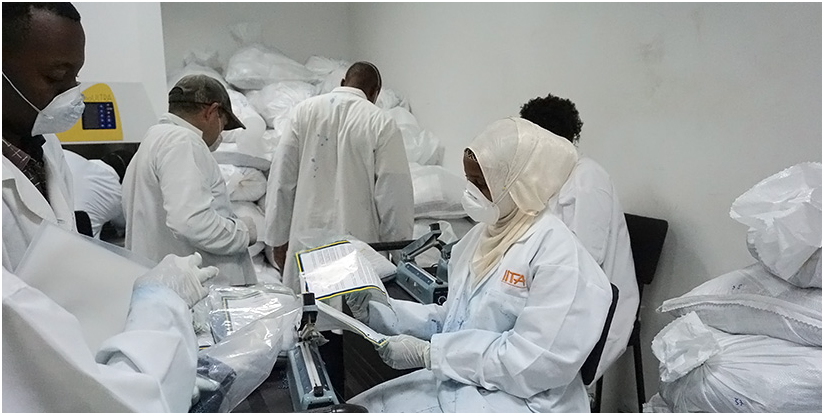In Africa, aflatoxin contamination in maize and groundnut will soon be a thing of the past. The International Institute of Tropical Agriculture (IITA) has come to the rescue in efforts to reduce the contamination in Tanzania.
The essence is to enhance the country’s food safety and security during this challenging time for the agriculture sector due to ravaging COVID-19 pandemic.
Through its office in Tanzania, IITA produced 10 tons of AflasafeTZ, the natural and safe product that reduces aflatoxin contamination by over 90% in maize and groundnut for use in the country this cropping season.
This was after the company contracted to commercialise and mass produce the product in Tanzania. A to Z was unable to get its factory up and running on time due to delayed arrival of crucial equipment.
The delay was as a result of interruptions in logistics brought about by the COVID-19 outbreak and the measures put in place by various governments to control its spread.
The company was therefore not able to roll out its first batch of produce on time for customers who had ordered the product for this year’s growing season. AflasafeTZ needs to be added to maize two to three weeks after flowering and 40 days for groundnut.
A to Z’s Group Sales and Marketing Manager, Bhubhinder Singh, says “we were expecting a Bio-safety Cabinet the first week of April, but we have not received it until now. We cannot commence production without it. So we were glad we could order and get 10 tons of the product from IITA to supply our customers. We had placed another order of 5 tons in February but we had sold all of it.”
Singh was happy to note that the awareness of the dangers of aflatoxin was increasing and so was the demand for AflasafeTZ. This was mostly for farmers supplying industries such as breweries and millers and exporting to neighbouring Tanzania.
Aflasafe was shipped to the A to Z plant in Arusha, Tanzania, on April 28 from IITA’s offices in Dar es Salaam, Tanzania.
The Aflasafe technology was developed by the United States Department of Agriculture (USDA) and together with IITA, country-specific products for African countries have been developed.
In Tanzania, the product AflasafeTZ was developed in partnership with the country’s Ministry of Agriculture and other partners.
Following five years of rigorous research to develop the product, AflasafeTZ was fully registered and approved for use in Tanzania.
This was after it was found efficient in reducing aflatoxin contamination in maize and groundnut, and safe with no adverse effects on humans or livestock in 2018.
Last year, after another rigorous selection process, A to Z was chosen to mass-produce the product and distribute it to farmers across the country with IITA providing technical backstopping.
The company has invested in an Aflasafe manufacturing plant and a laboratory for quality control; the first production was anticipated for this planting season.
IITA Director for Eastern Africa, Victor Manyong, says “we have been providing technical backstopping and quality control in the production of Aflasafe to A to Z. That is why we did not hesitate to jump in when we saw the dilemma they were in due to the delay in the arrival of important equipment.
‘’COVID-19’s impact on the agriculture sector includes interruptions on the supply of inputs due to restrictions in movement and cross-border movement. Therefore, by producing Aflasafe in our mini plant in Dar es Salaam, Tanzania, we can quickly fill in this gap in the maize and groundnut value chain in the country.”
IITA in Tanzania has a small processing unit that produces up to two tons of Aflasafe per day, mostly for research in the country and the neighbouring countries of Rwanda, Malawi, Mozambique, and Zambia.
The processing unit also produced five tons of AflasafeTZ for A to Z in February this year for its field research and to process orders from some of its customers.
This work is also part of IITA’s Business Incubation Platform, which supports private sector companies such as A to Z to commercialise technologies generated from IITA’s research so they are available to farmers and applied to address challenges in the agriculture sector in Africa.







